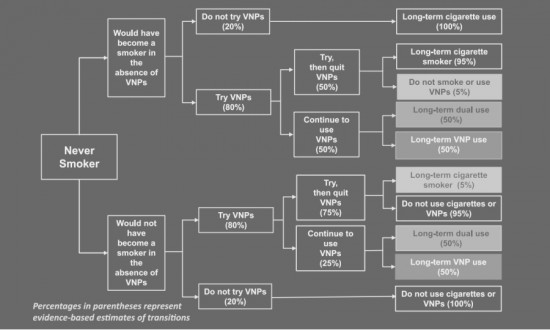E-Cigarettes Could Cut Smoking-Related Deaths by 21%, New Research Finds
Using electronic cigarettes as an alternative to tobacco cigarettes could result in a 21 percent reduction of smoking-related deaths as well as as a 20 percent decrease in years lost due to premature mortality, a study conducted by an international team of tobacco control experts found.
 The paper, entitled “The application of a decision-theoretic model to estimate the public health impact of vaporized nicotine product initiation in the United States” was published in the Nicotine and Tobacco Research, earlier this month. In it, the authors show the impact that electronic cigarettes – referred to as “vaporized nicotine products” or VNPs – have on public health “in terms of how their use alters smoking patterns among those who would have otherwise smoked cigarettes and among those who would not have otherwise smoked cigarettes in the absence of VNPs.” The model they devised incorporates “transitions from trial to established VNP use, transitions to exclusive VNP and dual use, and the effects of cessation at later ages.”
The paper, entitled “The application of a decision-theoretic model to estimate the public health impact of vaporized nicotine product initiation in the United States” was published in the Nicotine and Tobacco Research, earlier this month. In it, the authors show the impact that electronic cigarettes – referred to as “vaporized nicotine products” or VNPs – have on public health “in terms of how their use alters smoking patterns among those who would have otherwise smoked cigarettes and among those who would not have otherwise smoked cigarettes in the absence of VNPs.” The model they devised incorporates “transitions from trial to established VNP use, transitions to exclusive VNP and dual use, and the effects of cessation at later ages.”
“Using data from the National Health Interview Surveys administered by the U.S. Census Bureau from 1965 to 2012, the researchers applied projected rates for people to start and quit smoking, Bloomberg reports. “In doing so, they estimated the prevalence of long-term e-cigarette and cigarette smoking through the year 2083 to create their mathematical model.”
Unlike previous models of VPN use, this one used national rather than regional data, made a clear distinction between regular vaping and casual trial of e-cigarettes, and considered “whether youth and young adults initiating VNP use would have been likely to have been a smoker in the absence of VNPs.”
Based on the results of their analysis, researchers concluded that using electronic cigarettes as an alternative to smoking can lead to “a reduction of 21% in smoking-attributable deaths and of 20% in life years lost” among young people born after 1996.
“E-cigarettes can provide the potential to reduce harm and also improve the public health if used as an alternative to cigarette smoking,” said lead author David Levy, Professor at Georgetown University in Washington, US. “Our study indicates that, considering a broad range of reasonable scenarios, e-cigarettes are likely to reduce cigarette smoking and not lead to offsetting increases in harm from the use of e-cigarettes and more deadly cigarettes.”

Photo: Levy et al. paper
“When we consider the plausible positive and negative aspects of e-cigarette use, we find that vaping is likely to have a net positive public health impact,” the team of researchers from the United States, Australia, and Canada wrote in their recently-published paper.
Their mathematical model incorporated “conservative estimates” of the likely uptake of vaping and smoking by adolescents and young adults, but their research of vaping patterns suggests that “recent claims by some scientists that e-cigarettes are likely to act as a gateway to the use of tobacco products are overstated.” The gateway theories has been debunked by several studies and surveys, but that hasn’t stopped vaping opponents from using it as an argument in the fight against electronic cigarettes.
Speaking about the FDA’s finalized regulations of electronic cigarettes, Prof. David Levy said he agrees with the measure to ban their use by youths under the age of 18 “because we still want to discourage use of all nicotine and cigarette products,” but expressed concern that regulating e-cigarettes in the same manner as cigarettes will make it harder for smaller companies to gain market approval for their products. “They’re going to make it difficult for certain producers of e-cigarettes to stay on the market,” Levy said, adding that this may strangle the ability of e-cigarettes to eventually replace analogs in the marketplace.
















